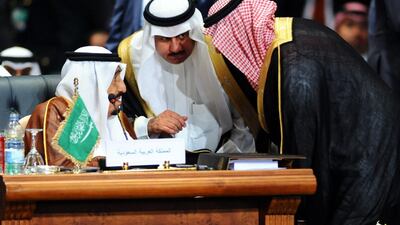ABU DHABI // The centre of power in the Middle East is shifting from the Levant to the Arabian Gulf because of security issues and political turmoil.
That is according to political analysts at a conference in Abu Dhabi on Wednesday.
They said the future of the Arab world would be bleak if countries did not recognise and accept that political, cultural, religious and gender diversity were necessary for stability.
The Middle East’s centre of power was always in the Levant, but it was moving to GCC countries, said Abdullah Al Shayji, a professor of political science at Kuwait University and visiting professor at George Washington University.
“It is a fact and a reality that was confirmed by the Saudi Arabian-led coalition [battling ISIL],” he said, adding that Operation Decisive Storm had changed the stereotypical image of Arab countries as weak.
“It surprised many parties, including the US,” Prof Al Shayji said on the second day of the annual conference of the Emirates Centre for Strategic Studies and Research. “There is now a retreat of the US’s role and its allies are worried about this.
“The more there is equality of power in a region, the more stable that region is and the less likely it is to have wars and armed conflict.”
The Arab coalition’s military campaign was a “wake-up call” to countries such as Turkey, Iran and the US.
“We [the Arab states] are now mature, we can deliver, stand up, be counted and deter our enemies,” said Prof Al Shayji.
He noted that the question of whether Saudi Arabia could launch an airstrike against Iran was asked for the first time in Iran’s parliament recently.
“That is a change of mindset. Iranians never thought Arabs would take such a position,” said Prof Al Shayji.
Although battling religious extremism and ISIL was necessary, faith in diversity and pluralism was crucial in helping the Arab world to achieve stability, said Dr Marwan Muasher, vice president for studies at the Carnegie Endowment for International Peace in the US.
“Pluralism is not the only condition to reach stability, but it is one of the prerequisites because without it no society can reach sustainable prosperity,” he said.
Moving towards an economy based on competence and productivity rather than energy commodities was essential, he said. “Reaching all these objectives will take a lot of time and effort,” said Dr Muasher.
“It will include completely rethinking education models in the Arab world, which are instructive but do not encourage critical thinking.
“There are no benefits in repackaging existing policies. There is a need to come up with new policies and defining steps that will reach a stable society.”
Richard Makepeace, registrar at the Oxford Centre for Islamic Studies in Britain, said the region had experienced unparalleled change in the past few weeks.
He said proposals to set up a regional Arab military force could be a very important and positive development.
In the region, people of different nationalities and ethnic backgrounds had been living together in “remarkable harmony”, he said, adding there were places where that remained the case, such as the UAE.
“It is tremendously important that we in the West do not lose sight of that traditional role of the Middle East as a place where everyone was welcome and had their rights,” said Mr Makepeace.
cmalek@thenational.ae

